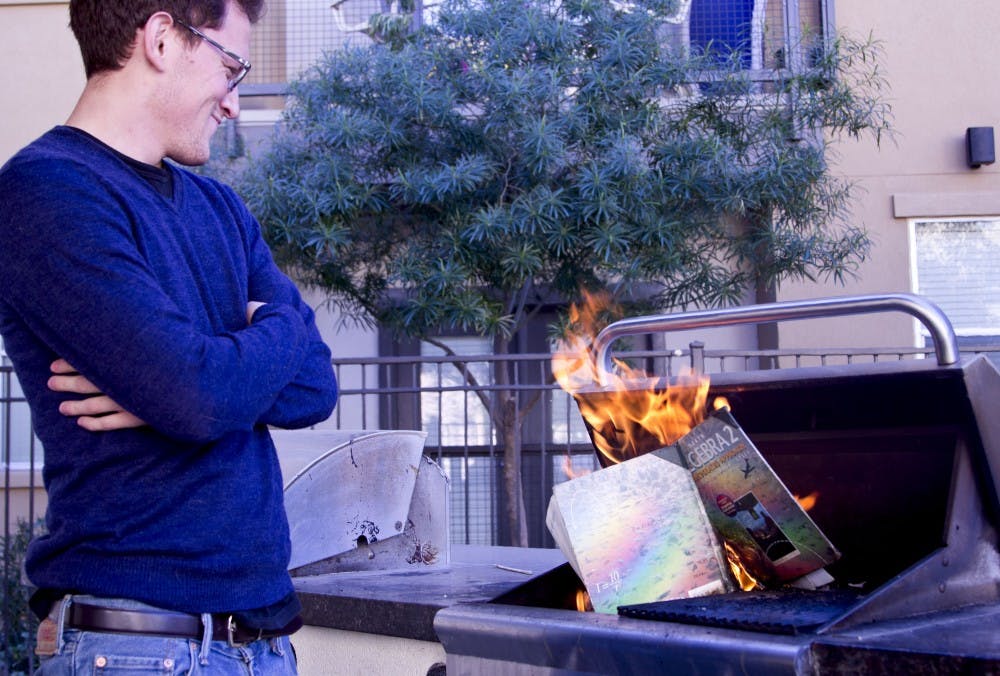 Professors and students are on the same side of the battle when it comes to the price of textbooks.
Professors and students are on the same side of the battle when it comes to the price of textbooks.Photo by Ana Ramirez
In light of rising tuition costs and student loans, pricy textbooks seem little more than fiscal thorns in students’ sides. Though dissent for textbook publishers is widespread among the student body, a special contempt seems to exist for professors who peddle their own books as required reading.
Alex Harris, a genetics and developmental biology junior, feels that students are being overcharged for an unnecessary service, arguing that a textbook should provide a different perspective on class material than that which a professor chooses to teach.
"If a professor sells you a textbook, you're hearing the same thing twice," Harris says.
In an age of crippling student debt, financial concerns are among those most widely held by students. Tyler Boynes, a business management and communications junior had to pay over $100 for a hardcover textbook released yearly by one of his professors. Because a new edition was released every year, he could not sell it back to the ASU bookstore.
"They won't buy back books for the sole reason that they want to make money," he says. "They obviously want to make a profit."
"Even if professors aren't in it for the money, it remains suspect," says Jake Gamze, an economics and Chinese sophomore. Gamze sees professors selling their books to students as a detriment to the teacher-student relationship. "Students aren't going to trust a professor that's just trying to make money off of them," he says.
Though he thinks the book-seller/professor relationship is unfair, Gamze appreciates that a professor has the expertise necessary to write books for their own classes. "Very few know the material better than a professor," he says.
Gamze cites the continual re-release of new editions of textbooks as the main "sketch factor" in the system, which seem to be released yearly.
Matt McCarthy is a senior lecturer at the W.P. Carey School of Business. He teaches CIS 105, an introductory business technology course for which he has also published his own textbook.
"Not to be an egotistical bastard, but who knows more about my class than me? Every chapter, every word, every syllable is used in my class," he says.
As a parent of an ASU student, McCarthy was sensitive to the price of his book. He called his publisher because his book price was getting "out of hand."
"I don't get free books," McCarthy says. "I'm paying the same price that everyone else is."
For years, his book "Black and White Business Computing," was sold as a paper book. Amazon has the original version available for $136. McCarthy spent a year reclaiming his original copyrights to reformat his book into five digital books available at $9.99 each.
"Not only are they now infinitely cheaper, they're infinitely easier because they work on every device there is," he says.
McCarthy's new format also allows him unhindered flexibility with regard to the content of his books, which he updates monthly. He regretted not being able to update his paper book's content to include cloud computing when the technology came about last year. The new e-format allows him to change the content of his book as technology advances.
 Ryan Espinoza-Marcus stands by to watch the flame consume an old textbook.
Ryan Espinoza-Marcus stands by to watch the flame consume an old textbook.Photo by Ana Ramirez
McCarthy likens staying with a paper book and traditional publisher to "being a barber with a sh-tty haircut. How are you teaching a computer information systems class at one of the most prestigious business schools in the world and using a paper book? Like, what the hell?"
David Bull, a chemical engineering junior, does not care who sells him his textbooks. While he objects to professors using their books to profit from student buyers, "If it's a good textbook, I don't care," he says. "As long as I learn the material I need to know."
Often professors produce books worthy of praise. They win awards and their books are used in universities throughout the nation.
Steve Neuberg, professor of psychology as ASU wrote his book, "Social Psychology: Goals in Interaction," which is used across the world in community colleges and Ivy League schools.
"We wrote the book because we were dissatisfied with the alternatives, and I truly believe that this the best book out there to cover the material I think is important," Neuberg says in an email.
Neuberg says, "Very few folks get rich writing textbooks," and that he "can't imagine anyone making substantial money by assigning textbooks to their own classes."
Psychology senior Tessa McCurdy was required to buy Neuburg's book for a social science class taught by the professor and was pleased with what she had purchased. She found the book well-written, and she was able to return it to the bookstore for a buyback at the semester's end. "It was nice because it followed the lectures well," she says. "It had good examples. It was clean-cut but not boring to read."
McCarthy says that the economy of books at university "sucks" because students have no choice as to the books they must purchase. Professors choose textbooks and their students are obligated to buy them. "Do they give a sh-t what it costs? I do," McCarthy says.
McCarthy donates the royalties from his book to W.P. Carey, a school that he says "expects excellence."
"If I was doing anything else, I'd kinda feel like a douche," he says.
He laughs when asked if he keeps the proceeds for himself.
"You think I'd be here?" he asks, regarding the courtyard with a shake of his Marlboro. "I'd be in baja in my little mansion."
Reach the writer at rjespin@asu.edu or via Twitter @scotchandfoie




